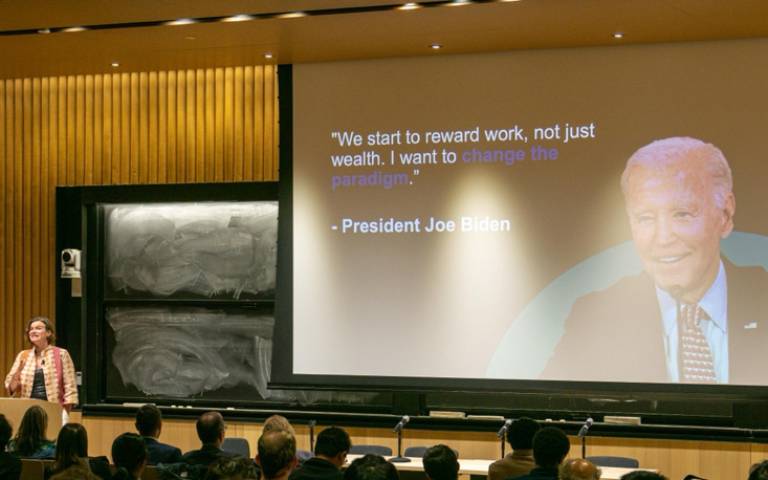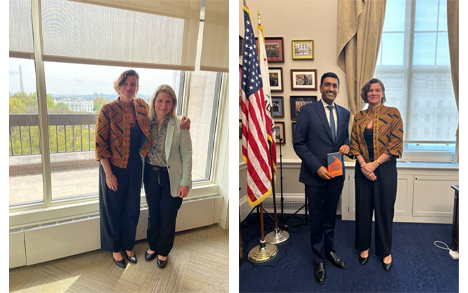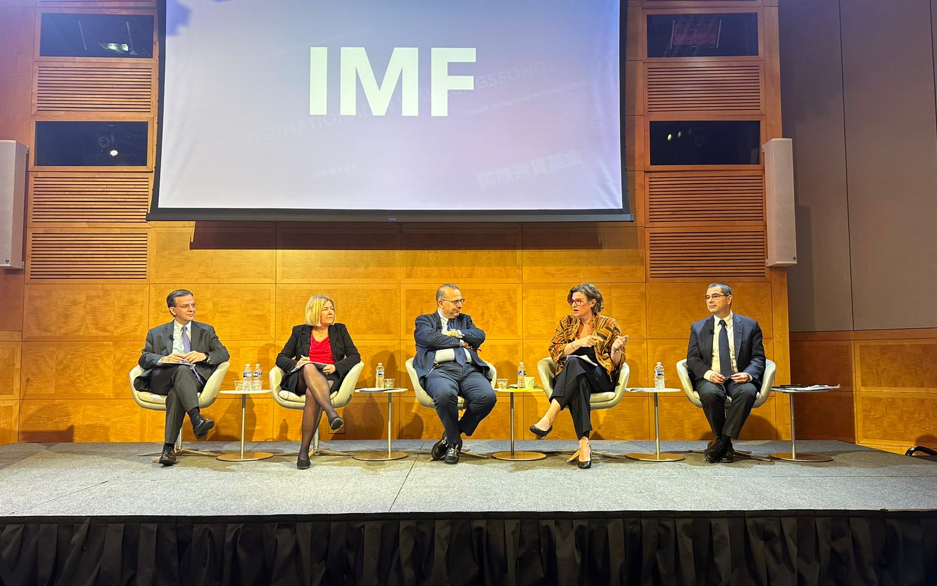IIPP Team Inform US Government on Industrial Policy
23 April 2024
During their week-long trip to Washington DC and Boston, Professor Mazzucato and her team build on the institute's work with the US Department of Commerce to scale learnings from the CHIPS and Science Act.

The United States is leading on industrial policy. The Inflation Reduction Act (IRA), the CHIPS and Science Act (CHIPS), and the Bipartisan Infrastructure Bill have generated more than $4 trillion in public and private investment in the US economy since 2021.
Yet, while the US economic recovery is strong, structural weaknesses in the form of financialization and low intergenerational mobility persist. The US financial sector has decoupled from the real economy with all US publicly traded companies having spent $6.3 trillion on stock buybacks between 2010 and 2019, a figure that continues to grow.
Professor Mariana Mazzucato, Director of the UCL Institute for Innovation and Public Purpose (IIPP), and her team at IIPP have been advising the White House and the US Department of Commerce on the implementation of the CHIPS and Science Act. As part of this work, the Department of Commerce has embedded conditionalities in CHIPS to prohibit share buybacks, incentivise worker training and access to childcare, and promote energy and water-efficient supply chains.
Prof. Mazzucato’s and IIPP’s work has been cited in two previous Annual Economic Reports to the President (2022 and 2023) from the White House Council of Economic Advisors, as well in the 2023 landmark speech from Brian Deese (Former Director of Biden’s National Economic Council) on a new approach to US industrial policy.
Building on these ongoing relationships as well as previous meetings with the White House in 2022, Prof. Mazzucato and her team travelled to Washington DC at the beginning of April 2024. During two private roundtables – one with the White House Council of Economic Advisors and one with members of the US Congress, Senate, and Biden Administration – and a meeting with Brian Deese, the IIPP team discussed how to scale learnings from CHIPS. Dispelling critiques of the government burdening its innovation policy with social provisions, Brian Deese has called its approach to conditionalities “an example of Capitalism at its finest.” But there is room for improvement.

Prof. Mazzucato meets with Congressman Ro Khanna and AFL-CIO President Liz Schuler in Washington DC.
During separate meetings with Ro Khanna, Democrat Congressman from California, and Liz Schuler, President of the AFL-CIO, the country’s biggest trade union confederation, the IIPP team discussed how best to expand conditionalities to strengthen worker protection and labour standards, while implementing them in a way that is mandatory and measurable.
After presenting her UN report on mission-oriented public development banks at the IMF-World Bank Annual Meetings in Marrakesh, Morocco in October 2023, Prof. Mazzucato was invited to deliver a seminar at the IMF headquarters in Washington DC. One week ahead of the Spring Meetings, she spoke to a packed room of IMF and World Bank staff on a new approach to industrial policy.
The two international financial institutions have been slow to adopt new economic thinking and expand their policy toolkit to consider the use of public development banks, strategic procurement, and other industrial policy tools. IIPP’s existing work with the European Commission, the UK, and Brazil, underscores the importance of adopting the full suite of policy tools as well as investing in government capacity to support industrial policy efforts.

Prof. Mazzucato delivers a seminar at the IMF in front of IMF and World Bank staff.
During their time in Boston, the IIPP team strengthened ties with Harvard Kennedy School’s Reimagining the Economy Project. Both are part of the Emergent Political Economies (EPE) Network, which brings together academic institutes committed to advancing new economic thinking.
During her public lecture as part of a two-day conference on “What do global experiences in industrial policy teach us?” Prof. Mazzucato presented her work with Dani Rodrik (Ford Foundation Professor of International Political Economy) on a new approach to industrial policy with conditionalities The conference was attended by other leading academics, including Dani Rodrik (Ford Foundation Professor of International Political Economy), Daron Acemoglu (Elizabeth and James Killian Professor of Economics at MIT), and Gordon Hanson (Peter Wertheim Professor in Urban Policy).
IIPP also strengthened ties with the Center for Energy and Environmental Policy Research at the Massachusetts Institute of Technology (MIT). Following a public lecture at MIT, Prof Mazzucato was joined for a panel discussion by Brian Deese, Elisabeth Reynolds (Former Special Assistant to President Biden for Manufacturing and Economic Development), Jason Jackson (Associate Professor in Political Economy and Urban Planning at MIT), and David A. Mindell (Dibner Professor of the History of Engineering and Manufacturing at MIT).

Prof. Mazzucato after her MIT public lecture with Brian Deese, Elisabeth Reynolds, Jason Jackson, and David Mindell.
Prof. Mazzucato was joined by Sarah Doyle (Director’s Head of Policy) and Luca Kühn von Burgsdorff (Director’s Senior Policy Advisor) and received support from Isadora Spillman-Schappell (Cities Programme Manager) and Joe Morrisroe (one of IIPP’s MPA students).
 Close
Close

